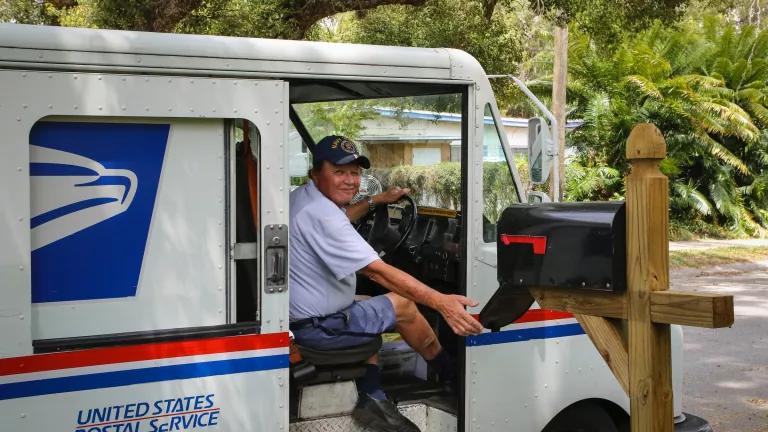Trump Left Our Democracy Wounded: These Two Bills Can Help to Repair It

The John Lewis Voting Rights Advancement Act and For the People Act are aimed at strengthening the foundations of our democracy so that we can build a more just and equitable society.
On Wednesday, Joe Biden will raise his right hand, take a solemn oath to preserve, protect, and defend the Constitution, and become the 46th president of the United States.
For the first time since the Civil War, the orderly transfer of presidential power will be protected, not by a shared sense of national purpose, but by armed troops, up to 25,000 in Washington, D.C., alone.
Their mission: to defend the nation’s capital, and American democracy itself, from an outgoing president and the mob he’s called to violent insurrection for no higher end than to retain power for himself by overturning the certified results of a free and fair election.
Biden has vowed to be the leader of all Americans: the 81.2 million who voted for him, the 74.2 million who voted for his opponent, and the millions more who didn’t vote at all. That’s how the presidency is supposed to work. It’s the only way it truly works.
Biden, though, is stepping into a house afire, lit by the rage of a defeated president hell-bent on burning it to the ground on his way out the door.
American democracy has survived four years of Donald Trump, but it’s been deeply wounded. The first order of business for the new president, the new Congress, and the nation at large must be to help heal, shore up, and strengthen our democracy.
The House of Representatives is poised for immediate action, with two pieces of legislation set for early action.
Both bills—the For the People Act and the John Lewis Voting Rights Advancement Act—were passed in the Democratically controlled House during the 116th Congress, but not in the Republican-controlled Senate. Both bills are being teed up in both houses for the 117th Congress, in which Democrats will have majorities in both the House and Senate. The bills are aimed at strengthening the foundations of our democracy so that, by the consent of the governed, we can build a more just and equitable society.
Together, these bills would provide needed reforms in three key areas: helping to protect every American’s right to vote; stopping corporate money from drowning out the voice of the people; and making sure the candidates we elect serve the public interest—not special interests.
Strengthening our democracy starts with making sure all of us are able to vote and that our votes count. That should go without saying. Unfortunately, a 2013 Supreme Court ruling gutted essential voter protections under the 1965 Voting Rights Act, a signal achievement of the Civil Rights movement led in that decade by the Reverend Dr. Martin Luther King Jr.
Since the 2013 ruling, we’ve seen a raft of burdensome restrictions, cumbersome requirements, and other changes put in place in many states that make it harder for low-income people, people of color, and Native Americans to vote.
The John Lewis Voting Rights Advancement Act—named for the late Civil Rights icon and longtime House member—lays the groundwork for restoring the protections the Voting Rights Act guarantees and strengthening voting rights for everyone. It would, for example, simplify voting by mail, expand early voting, and otherwise improve voter access to the ballot. And it would enhance the public oversight we depend on to ensure the integrity of our elections.

A second Supreme Court decision, in the 2010 case of Citizens United v. Federal Election Commission, opened the floodgates to corporate money that has distorted our elections, enabling wealthy individuals and large corporations to drown out the voices of the people, often without the public even knowing who’s behind the influence.
In the first decade after that decision, the nation’s 10 wealthiest political donors and their spouses pumped $1.2 billion into federal elections alone. The money needn’t even be identified with a particular party: Independent groups spent a staggering $4.5 billion on federal elections between 2010 and 2020, accounting for a record 22 percent of all election funding in the 2016 elections, up from 6 percent in 2008.
The For the People Act seeks to level the playing field and help return American democracy to American voters. It would require large donors to be identified so the public can know who’s behind the big spending. It would provide matching funds for the small donations of working people who want to raise their voice. And it would strengthen oversight of election finance laws and rules already on the books.
Finally, the For the People Act would bolster conflict-of-interest laws as part of an effort to enhance accountability and strengthen enforcement of ethics laws.
And it would require presidential candidates to release their tax returns to the public, so that never again could someone like Trump stiff the public on essential information the voters have every right to know. The new law would send the message that our democracy is not for sale.
Shoring up our democracy is an urgent task. It’s the only way we’ll ever be able to direct the national resources we need to cope with the welter of challenges we face and to grasp the opportunities before us.
It only works, though, when we all have the right to vote, to have our voices heard, and to hold our leaders to account.
Trump has waged an all-out campaign to weaken our democratic norms, and his assault has taken a serious toll.
For four years, he has used the bully pulpit to disparage and discredit a free and independent press, scientists, doctors, judges, economists, and other independent sources of objective truth.
Unsurprisingly, about half of Trump’s party agrees with him that the press is “the enemy of the people”; fewer than a third of Republicans have “a great deal” of confidence in scientists; and half of Trump’s party doesn’t trust the coronavirus advice of Dr. Anthony Fauci—the nation’s leading expert on infectious disease—while 66 percent trust Trump, who suggested last summer that we “stop testing” to artificially hold down the coronavirus case load.
For four years, Trump has demonized his political opponents, presiding over chants of “lock her up” at rallies and even publicly urging federal authorities to prosecute people like Biden and former President Barack Obama without evidence of wrongdoing.
There’s nothing to suggest Trump’s bullying has chilled speech by his opponents but those who stand up to him have been publicly harassed and even received death threats from Trump’s supporters.
And, for months, Trump has repeated the big lie that the November election was somehow “stolen” from him.
Sure enough, nearly eight in 10 Republicans—78 percent—say they don’t trust the results of the November election. Most made up their minds within days of the election, before judges threw out election challenges from Team Trump in more than 60 separate state and federal cases.
This is not where we need to be as a country. It’s not where we need to go. It is, though, where we find ourselves, and we’ve got to somehow dig our way out.
There’s no single solution to all of this. We’ve got a long road ahead. The John Lewis Voting Rights Advancement Act and For the People Act, though, are a good start. They can help protect our right to vote, prevent big money from drowning out the voice of the people, and provide better tools for holding elected officials to account. They deserve the support of every member of Congress.




